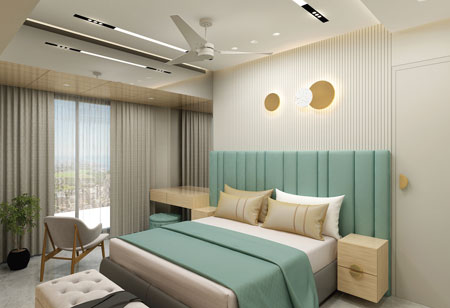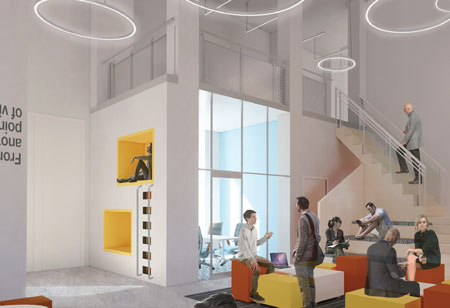
Dhawal Jain & Sheemantini Paik: Addressing The Architectural Landscape Of India As The Drivers Of Transformation & Exclusivity


Dhawal Jain & Sheemantini Paik
Co-Founders
Dhawal & Sheemantini engage in an exclusive interaction with CEO Insights.
Define Liminal Design Studio as an organization and its current position within the industry.
Dhawal:While most of the architecture firms cater to the top one percent of the current population of India, Liminal Design Studio was established with a notion to make architecture engaging and accessible. We have been breaking this barrier through approaching clients who we believe could benefit from our association and then working backward towards putting together funding and other clearances. This has been the reason we’ve had so much success in a period of just two years, the majority of which has been spent in the pandemic. We do work as consultants and designers on CSR projects too, which has been well received by our clients, which are some of the major corporations and fortune 500 companies.
Sheemantini:We work with clients who believe in our vision and look to work in synergy. We are a deliberate design firm and don’t take any default decisions in our journey.
What are the most advanced strategies and technological tools you have used in your multidisciplinary design studio and facilitate transformation in the design industry?
Dhawal:While being a part of this industry I have been exposed and inclined towards the practice of Impact Design, which is rarely understood and practiced in the Indian context. Impact design is rooted in the core belief that design can be used to create positive social, environmental, and economic change, and focuses on actively measuring impact to inform and direct the design process.
Given the landscape, we cater to end users who come from both
local and global backgrounds. And to meet their diversified demands, we have employees and interns from across the world, who bring a sense of novelty and uniqueness to the table.
Sheemantini:My experience of working on a plethora of residential spaces has informed my design process, and the same is reflected through our firm’s work. Be it Residential interiors or planning a Family bungalow or a corporate CSR project, you will see a good blend of design experiments and material explorations that make our projects unique. Our recently completed project, Apartment 32 has been well received.
Speaking about technological tools, we had done our Masters in the US, which is a technologically advanced country. We work on various BIM softwares and have made sure that’s a standard across our firm. The Indian Architecture industry lags in this aspect and we sincerely hope that the new generation of Architects help the industry facilitate this transition.
Share your views on the existing market opportunities across the architecture and interior design industry? How can the aspiring entrepreneurs contribute in this regard and what suggestions would you give to them?
Dhawal: We need more people in this industry who are willing to stand their ground in this profession. Architecture & Design is one such industry that has lost its charm in the last few years. Many young graduating professionals end up feeling disheartened upon seeing the current state of professional life. The extensive hours, the low pay, and lack of dignity have made people dream ordinary. The academic fields need to integrate entrepreneurism at pedagogic levels to change this mindset. This is one reason why we both have been involved in teaching at various levels to enable this transition. Entrepreneurship is the ability to bring change in an industry that is unwilling to change its traditional ways.
We have seen various industries such as banking, finance, Information Technology, and Data Science that are going through some amazing revolutions. But if the infrastructure, which supports all these industries has to grow in the right direction, it’s about time we enforce this change in our industry and embrace the challenges which come with it. Only then will Architects be able to truly bring about an entrepreneurial spirit in the profession.
Sheemantini:According to me, the interior design and architecture sector is very unorganized at present. Systemic changes are required to put the profession back on its track. It is important for the upcoming generation of professionals to be very mindful of what their principles are and what they are standing up against. We also have a long way to go in the realm of educating the general population on the importance of architecture and design and spreading this information among the masses. We need more entrepreneurs in the forefront who can push the existing boundaries at the moment.
What is the vision of your company? What is the roadmap that
Entrepreneurship is the ability to bring change in an industry that is unwilling to change its traditional ways
Sheemantini:My experience of working on a plethora of residential spaces has informed my design process, and the same is reflected through our firm’s work. Be it Residential interiors or planning a Family bungalow or a corporate CSR project, you will see a good blend of design experiments and material explorations that make our projects unique. Our recently completed project, Apartment 32 has been well received.
Speaking about technological tools, we had done our Masters in the US, which is a technologically advanced country. We work on various BIM softwares and have made sure that’s a standard across our firm. The Indian Architecture industry lags in this aspect and we sincerely hope that the new generation of Architects help the industry facilitate this transition.
Share your views on the existing market opportunities across the architecture and interior design industry? How can the aspiring entrepreneurs contribute in this regard and what suggestions would you give to them?
Dhawal: We need more people in this industry who are willing to stand their ground in this profession. Architecture & Design is one such industry that has lost its charm in the last few years. Many young graduating professionals end up feeling disheartened upon seeing the current state of professional life. The extensive hours, the low pay, and lack of dignity have made people dream ordinary. The academic fields need to integrate entrepreneurism at pedagogic levels to change this mindset. This is one reason why we both have been involved in teaching at various levels to enable this transition. Entrepreneurship is the ability to bring change in an industry that is unwilling to change its traditional ways.
We have seen various industries such as banking, finance, Information Technology, and Data Science that are going through some amazing revolutions. But if the infrastructure, which supports all these industries has to grow in the right direction, it’s about time we enforce this change in our industry and embrace the challenges which come with it. Only then will Architects be able to truly bring about an entrepreneurial spirit in the profession.
Sheemantini:According to me, the interior design and architecture sector is very unorganized at present. Systemic changes are required to put the profession back on its track. It is important for the upcoming generation of professionals to be very mindful of what their principles are and what they are standing up against. We also have a long way to go in the realm of educating the general population on the importance of architecture and design and spreading this information among the masses. We need more entrepreneurs in the forefront who can push the existing boundaries at the moment.
What is the vision of your company? What is the roadmap that
you have planned for Liminal Design Studio?
Dhawal:Ever since our inception, we started with the intention of being able to practice and work on quality projects across India and that’s how we planned out two locations Mumbai and Kolkata for our offices. Currently, we have clients, proposals, and projects happening in various parts of India and the US, and we plan to continue this growth.
we planned out two locations Mumbai and Kolkata for our offices. Currently, we have clients, proposals, and projects happening in various parts of India and the US, and we plan to continue this growth.

Sheemantini:We want to be agents of change in this industry across India and that is only possible if we continue unabashedly with our vision and work with as many clients, organizations, and people as possible, keeping them closely aligned to our mission.
Dhawal Jain, Co-Founder, Liminal Design Studio
A registered Architect in India and winner of several awards including the Young Business leader award and Design Intelligence's 'Design Futures Council' Scholar, Dhawal has been working in the Architecture and Design industry for more than seven years. His body of built projects extends across three continents and he is the Co-Founder & Managing Director at Liminal Design Studio.
•Hobbies:Cricket, Hikes, Football, Kayaking
•Favorite Cuisine:Mexican, Middle-eastern & Indian
•Favorite Travel Destination: Historic places with modern Architecture
•Favorite Book: Outliersn My Opinion, having an impact at any
•Awards & Recognition:2022 Best of Houzz, DFC Scholar by Design Intelligence, Community Choice Award by Core 77, Notable Interaction award by Core 77, Young Business leader by Leap Scholars.

Sheemantini Paik, Co-Founder, Liminal Design Studio
A young architect of India, Sheemantini holds experience of working in a few firms in India and the US. She is interested in practicing architecture that rethinks the way we look grow and adapt to our surroundings. She holds a Masters in Architecture from Virginia Tech and a Bachelors in Architecture from Jadavpur University. A trained artist, Sheemantini is passionate about arts, architecture, graphics, and anything that involves creativity.
•Hobbies:Music, Photography, Videography
•Favorite Cuisine:Asian, Middle-eastern, Mexican
•Favorite Travel Destination: Ladakh
•Favorite Book:The Alchemist by Paulo Coelho
•Awards & Recognition:2022 Best of Houzz, International Logo Design for the Indo-Bangladesh Bangla Games
Dhawal:Ever since our inception, we started with the intention of being able to practice and work on quality projects across India and that’s how
 we planned out two locations Mumbai and Kolkata for our offices. Currently, we have clients, proposals, and projects happening in various parts of India and the US, and we plan to continue this growth.
we planned out two locations Mumbai and Kolkata for our offices. Currently, we have clients, proposals, and projects happening in various parts of India and the US, and we plan to continue this growth.
Sheemantini:We want to be agents of change in this industry across India and that is only possible if we continue unabashedly with our vision and work with as many clients, organizations, and people as possible, keeping them closely aligned to our mission.
Dhawal Jain, Co-Founder, Liminal Design Studio
A registered Architect in India and winner of several awards including the Young Business leader award and Design Intelligence's 'Design Futures Council' Scholar, Dhawal has been working in the Architecture and Design industry for more than seven years. His body of built projects extends across three continents and he is the Co-Founder & Managing Director at Liminal Design Studio.
•Hobbies:Cricket, Hikes, Football, Kayaking
•Favorite Cuisine:Mexican, Middle-eastern & Indian
•Favorite Travel Destination: Historic places with modern Architecture
•Favorite Book: Outliersn My Opinion, having an impact at any
•Awards & Recognition:2022 Best of Houzz, DFC Scholar by Design Intelligence, Community Choice Award by Core 77, Notable Interaction award by Core 77, Young Business leader by Leap Scholars.

Sheemantini Paik, Co-Founder, Liminal Design Studio
A young architect of India, Sheemantini holds experience of working in a few firms in India and the US. She is interested in practicing architecture that rethinks the way we look grow and adapt to our surroundings. She holds a Masters in Architecture from Virginia Tech and a Bachelors in Architecture from Jadavpur University. A trained artist, Sheemantini is passionate about arts, architecture, graphics, and anything that involves creativity.
•Hobbies:Music, Photography, Videography
•Favorite Cuisine:Asian, Middle-eastern, Mexican
•Favorite Travel Destination: Ladakh
•Favorite Book:The Alchemist by Paulo Coelho
•Awards & Recognition:2022 Best of Houzz, International Logo Design for the Indo-Bangladesh Bangla Games
